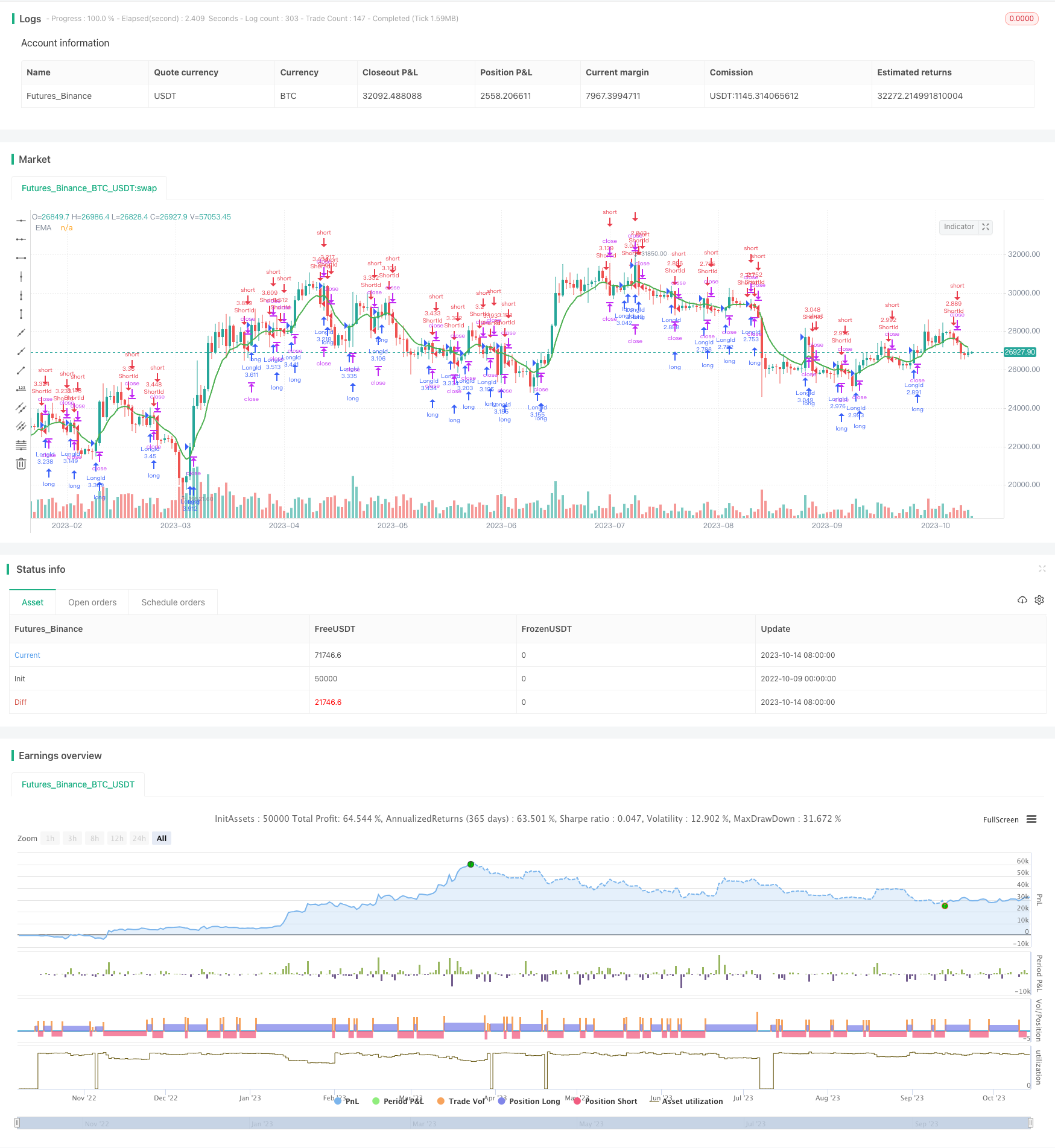EMA Trend Following Strategy
Author: ChaoZhang, Date: 2023-10-16 15:54:41Tags:

Overview
The EMA trend following strategy is a trend tracking strategy based on the EMA indicator. It judges the trend direction by calculating the EMA line of a specified period and follows the trend. It goes short when the price crosses above the EMA line and goes long when the price crosses below the EMA line. This is a typical trend following strategy.
Strategy Logic
The core of this strategy is to determine the trend using the EMA indicator. EMA is an exponential moving average that gives more weight to recent prices and responds faster to price changes. By calculating the average price over an EMA period, it produces a smoothed curve. When the price crosses above the EMA line from below, it signals an upward trend; when the price crosses below the EMA line from above, it signals a downward trend.
Based on this logic, the strategy shorts when price breaks out above the EMA and goes long when the price breaks out below the EMA, tracking the trend by following the EMA line. Specifically, it calculates an 8-period EMA on the closing price - shorting when the close breaks out above EMA and going long when the close breaks out below EMA. It also sets a stop loss to control risks.
Advantages
Effective trend following. EMA smoothes price fluctuations, filters out market noise and follows medium to long term trends.
Reasonable trading frequency. Compared to shorter-period indicators, EMA has a medium adjustment frequency, avoiding over-trading.
Simple to implement. The strategy relies solely on one EMA indicator yet achieves the goal of trend following.
Extendibility. The strategy can be enhanced by optimizing EMA parameters or adding other indicators.
Risks and Solutions
Missing tuning points. When prices reverse rapidly, EMA needs time to adjust and may miss best entry points. Solution is to combine with indicators that identify tuning points.
Increased losses. EMA follows trends and cannot accurately determine tuning points. Reversals may lead to large losses. Solution is to set reasonable stop loss.
Frequency too high or too low. Different EMA periods lead to different trading frequencies. Too short may over-trade, too long may miss opportunities. Solution is to test different EMA periods to find the optimal.
Enhancement Suggestions
Optimize EMA parameters to find the best balance. Stepwise optimization can determine the optimal EMA period.
Add other indicators to determine tuning points. Combine with indicators like RSI to better detect reversals.
Optimize stop loss strategy to find the best stop loss level through backtesting.
Optimize symbol selection. Adjust EMA periods based on symbol characteristics to achieve best results.
Summary
The EMA trend following strategy is a very typical trend tracking strategy based on an indicator. It is simple and easy to implement, suitable for beginners to learn. Meanwhile, it has extendibility to further improve the strategy by adding indicators or optimizing parameters. With continuous improvements, it can become a very practical trend following tool.
/*backtest
start: 2022-10-09 00:00:00
end: 2023-10-15 00:00:00
period: 1d
basePeriod: 1h
exchanges: [{"eid":"Futures_Binance","currency":"BTC_USDT"}]
*/
//@version=3
strategy(title = "EMA Close Strategy", shorttitle = "EMA Close",calc_on_order_fills=true,calc_on_every_tick =true, initial_capital=21000,commission_value=.25,overlay = true,default_qty_type = strategy.percent_of_equity, default_qty_value = 100)
EmaSource = input(defval = close, title = "EMA Source")
EmaLength = input(defval = 8, title = "EMA Period", minval = 1)
StartYear = input(2018, "Backtest Start Year")
StartMonth = input(1, "Backtest Start Month")
StartDay = input(1, "Backtest Start Day")
stopLoss = input(30, title = "Stop loss percentage(0.1%)")
UseStopLoss = input(true,"UseStopLoss")
window() => time >= timestamp(StartYear, StartMonth, StartDay,00,00) ? true : false
EMA = ema(EmaSource,EmaLength)
plot(EMA, title = "EMA", color = green, linewidth = 2, style = line, transp = 50)
long = crossunder(EMA, close)
short= crossover(EMA, close)
if (long)
strategy.entry("LongId", strategy.long, when=window())
if (short)
strategy.entry("ShortId", strategy.short, when=window())
if (UseStopLoss)
strategy.exit("StopLoss", "LongId", loss = close * stopLoss / 1000 / syminfo.mintick)
strategy.exit("StopLoss", "ShortId", loss = close * stopLoss / 1000 / syminfo.mintick)
- Trend Following Buy and Sell Strategy
- He is also a member of the board of directors of the National Association for the Advancement of Science.
- RSI and Moving Average Crossover Multi Timeframe Trading Strategy
- Combo Strategy of 123 Reversal and Smoothed RSI
- Dual EMA Crossover Trading Strategy
- Dynamic ATR Stop Loss Center Line Strategy
- Dual EMA Crossover Strategy
- Ichimoku Cloud Day Trading Strategy
- Dynamic Risk-Adjusted Leverage Trading System
- MACD Momentum Strategy
- Dual Moving Average Reversal Trading Strategy
- SMA Ichimoku Crossover Strategy
- Ichimoku Cloud with MACD Strategy
- Wick Reversal Pattern Strategy
- Ocean Theory Grid Trading Strategy
- SuperTrend Strategy
- Ichimoku Breakout Strategy
- Dynamic Strategy Analytics Tool
- Mini Pullback Supertrend Strategy
- Dual Smooth Moving Average Trading Strategy